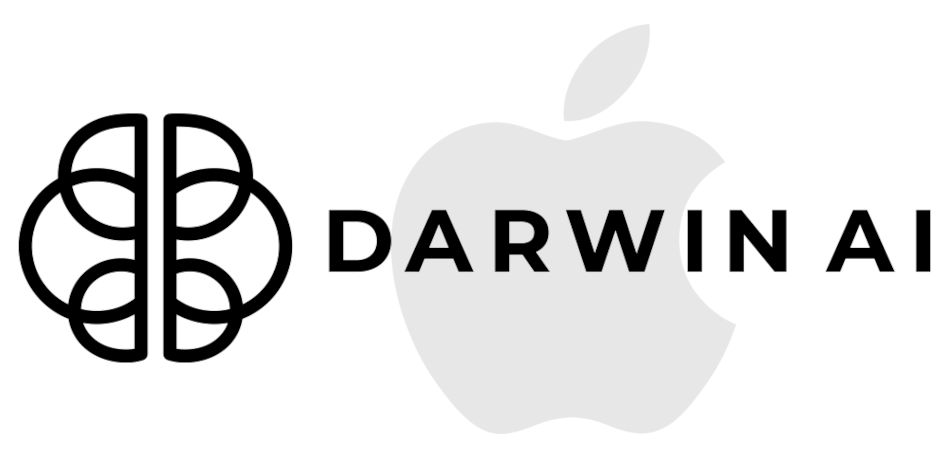
If You Can't Make It Buy It: Apple Acquires Darwin AI Hoping to Develop Its Own Gemini Nano Model
The Implications of Apple's Acquisition on the Race for On-Device AI Supremacy
NEWS Apple March 15, 2024 Reading time: 3 Minute(s)
Apple has recently acquired DarwinAI, a Canadian AI startup renowned for its expertise in creating compact and efficient AI systems. This strategic move by Apple comes hot on the heels of Google's announcement of its Gemini Nano model, underscoring the growing significance of on-device AI processing.
According to a Bloomberg report, Apple's acquisition of DarwinAI earlier this year has set the stage for a substantial shift in its AI strategy. DarwinAI's specialization in developing smaller and faster AI systems aligns perfectly with Apple's vision for enhancing on-device processing capabilities.
DR. ALEXANDER WONG
 The report further reveals that numerous former DarwinAI employees, including distinguished AI researcher Alexander Wong, have transitioned to Apple's AI team, indicating a concerted effort by Apple to bolster its AI talent pool.
The report further reveals that numerous former DarwinAI employees, including distinguished AI researcher Alexander Wong, have transitioned to Apple's AI team, indicating a concerted effort by Apple to bolster its AI talent pool.
While Apple traditionally maintains discretion regarding its acquisitions, the absorption of DarwinAI suggests a pivotal step towards integrating on-device AI functionalities into its forthcoming products, particularly iPhones and Macs. This strategic maneuver signifies Apple's recognition of the pivotal role that on-device AI processing plays in shaping the future of technology.
It should be noted, however, that the acquisition of a third-party entity specialized in a specific IT sector can only be interpreted as a company's inability to independently develop its own autonomous system. Similar situations have already happened in the past, for example with the acquisition of Camel Audio by Apple, with the aim of being able to implement their advanced audio plugins (in particular the "Alchemy" software synthesizer) within Garage Band, as Apple wasn't able to independently develop a piece of software that could be highly competitive in that specific market segment.

CAMEL AUDIO ALCHEMY
That said, the allure of on-device AI processing lies in its myriad advantages, notably in terms of privacy and functionality. By executing AI tasks locally, sensitive user data can be kept secure, circumventing the need for extensive data transmission to cloud servers. Consequently, this approach augments user privacy and mitigates potential security risks associated with centralized data storage. Moreover, on-device AI empowers users to access AI features seamlessly, even in offline environments, while also potentially reducing processing costs for frequently utilized functionalities.
APPLE'S CEO TIM COOK
 CEO Tim Cook's recent allusions to forthcoming AI announcements, coupled with the impending Worldwide Developers Conference (WWDC) in June, hint at Apple's ambitious plans to unveil a plethora of AI-powered features. These enhancements are anticipated to span across various facets of the Apple ecosystem, encompassing Siri improvements, AI-driven functionalities in Messages, iWork, Apple Music, and beyond. As the tech community eagerly awaits the unveiling at WWDC, anticipation mounts regarding how Apple intends to leverage its AI advancements to redefine user experiences across its product lineup.
CEO Tim Cook's recent allusions to forthcoming AI announcements, coupled with the impending Worldwide Developers Conference (WWDC) in June, hint at Apple's ambitious plans to unveil a plethora of AI-powered features. These enhancements are anticipated to span across various facets of the Apple ecosystem, encompassing Siri improvements, AI-driven functionalities in Messages, iWork, Apple Music, and beyond. As the tech community eagerly awaits the unveiling at WWDC, anticipation mounts regarding how Apple intends to leverage its AI advancements to redefine user experiences across its product lineup.
IMAGES CREDITS: APPLE, CAMEL AUDIO, DARWIN AI
*Our pages may contain affiliate links. If you buy something via one of our affiliate links, Review Space may earn a commission. Thanks for your support!
CATEGORIES

























COMMENTS